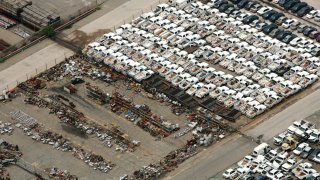From Rust to Riches: Venezuela’s Sanctions Evasion Strategy
Scrap metal exports have proven a valuable source of dollars for the heavily sanctioned Maduro regime.
As Venezuelans brace for an unpredictable presidential election this July, the United States faces a critical challenge: how to push Nicolas Maduro’s authoritarian regime toward genuine democracy. Sanctions—imposed, then removed, then reimposed—have achieved little, at least partly because the Maduro regime has developed sanctions evasion tactics that bring billions of dollars in cash into the regime’s coffers. To close the loophole that Maduro is exploiting, the Treasury Department should publish a comprehensive list of Venezuelan state-owned enterprises (SOEs) believed to be major sources of revenue for Maduro’s regime as an appendix to its current sanctions on his government.
Much of Maduro’s ability to resist sanctions derives from the “Anti-Blockade Law,” enacted in 2020, which encourages the regime’s 576 SOEs, many linked to the military, to form opaque “strategic” alliances with third parties abroad while concealing the government’s involvement. This opacity creates uncertainty among financial institutions, many of which do not block payments involving Venezuelan SOEs despite their apparent links to Maduro. The proceeds from this unchecked commercial activity fund the regime’s oppressive security forces and enrich its kleptocratic allies, diverting desperately needed resources from the Venezuelan people.
Publishing a comprehensive list of Venezuelan SOEs by name, along with the names of the relevant executives who run them, would be a simple and cost-effective way to supercharge private sector compliance efforts and prevent the Western financial system from facilitating transactions with Venezuelan SOEs. This move would effectively eliminate any ambiguity that currently provides banks plausible deniability for such dealings. Executive Order 13884 already blocks all property belonging to and dealings with Maduro’s government, but it does not explicitly list Maduro’s SOEs as constituting government property.
Nevertheless, the Treasury Department could publicly determine, through the publication of an annex, which SOEs are owned by and operating on behalf of Maduro’s government and should, therefore, be considered blocked for sanctions enforcement. This clarification would ease the compliance burden on banks and financial institutions, providing them with a convenient means to screen transactions potentially involving SOEs that benefit the Maduro regime.
Consider the case of CORPOEZ, a Venezuelan SOE that coordinates the country’s lucrative global scrap metal exports. A senior official of Venezuela’s sanctioned military counterintelligence directorate runs it. Over a decade, Venezuela’s scrap iron exports surged from just $75 million in 2012 to $570 million in 2022. Scrap metal exports have infiltrated major markets like India and Turkey—a small quantity has even found its way to the United States. This illicit trade highlights how Maduro and his military enablers continue to evade sanctions and fund the regime and its abusive security forces as the Venezuelan people suffer. It also demonstrates an unnecessary gap in U.S. targeting and enforcement with respect to sanctions on Maduro and his closest military allies, who sit atop the government’s prized SOEs.
Publicly identifying Venezuelan SOEs such as CORPOEZ and prohibiting all dealings with them would yield immediate impacts against Maduro and his allies. As the United States searches for leverage to push Maduro toward allowing a fair election, Washington must explore the possibility of deploying new tools and capacities against the regime. The Biden Administration should also consider enhancing customs screening of Venezuelan exports, providing clearer advisories on identifying Venezuelan state-linked commercial activity, and sanctioning foreign facilitators of trade benefiting the Maduro regime. These actions can be taken now, as entities such as CORPOEZ are clearly owned by and operating on behalf of the Maduro regime. The high volume of scrap metal flowing from Venezuela to Turkey, for example, could warrant sanctions designations against non-compliant Turkish importers and financial institutions aiding Maduro’s sanctions evasion network.
By revamping its sanctions strategy, enlisting the power of private sector compliance departments, and increasing enforcement efforts, the United States could cut off Maduro’s corrupt cash pipelines. Restricting the regime’s revenue would not only advance democratic interests in Venezuela but also uphold the integrity of U.S. sanctions as a powerful deterrent against the abuse of power by authoritarian regimes globally. As Venezuelans demand change at the polls, Washington must match their democratic aspirations by ensuring its sanctions aggressively and completely deny resources to Maduro’s oppressive regime.
Max Meizlish is a Senior Research Analyst for the Center on Economic and Financial Power at the Foundation for Defense of Democracies. He previously worked as a sanctions enforcement officer at the Treasury Department’s Office of Foreign Assets Control. Follow him on X: @maxmeizlish.
Image: Jimmy Pirela / Shutterstock.com.

